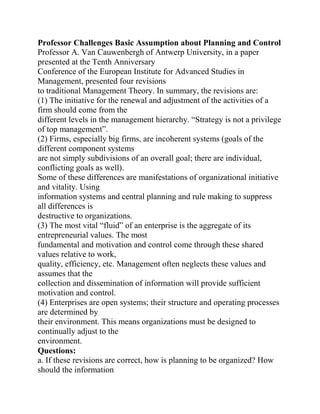Professor challenges basic assumption about planning and control
•Download as DOCX, PDF•
0 likes•1,940 views
Report
Share
Report
Share

Recommended
More Related Content
What's hot
What's hot (20)
Mgt503 principles of management complete handouts from lecture no. 1 to lectu...

Mgt503 principles of management complete handouts from lecture no. 1 to lectu...
ERP-Case Study- Changes before and after implementing ERP in a company

ERP-Case Study- Changes before and after implementing ERP in a company
Similar to Professor challenges basic assumption about planning and control
Similar to Professor challenges basic assumption about planning and control (20)
Management science , system theory, contingency theory (comparison)

Management science , system theory, contingency theory (comparison)
WHY KNOWLEDGE MANAGEMENT SYSTEM FAILED by DANIEL DONI SUNDJOJO

WHY KNOWLEDGE MANAGEMENT SYSTEM FAILED by DANIEL DONI SUNDJOJO
1. Change in Organizations2. Planned Change Strategies3. Res.docx

1. Change in Organizations2. Planned Change Strategies3. Res.docx
ORGANISATIONAL EFFECTIVENESS ASSESSMENT SLIDES (1).pptx

ORGANISATIONAL EFFECTIVENESS ASSESSMENT SLIDES (1).pptx
Professor challenges basic assumption about planning and control
- 1. Professor Challenges Basic Assumption about Planning and Control Professor A. Van Cauwenbergh of Antwerp University, in a paper presented at the Tenth Anniversary Conference of the European Institute for Advanced Studies in Management, presented four revisions to traditional Management Theory. In summary, the revisions are: (1) The initiative for the renewal and adjustment of the activities of a firm should come from the different levels in the management hierarchy. “Strategy is not a privilege of top management”. (2) Firms, especially big firms, are incoherent systems (goals of the different component systems are not simply subdivisions of an overall goal; there are individual, conflicting goals as well). Some of these differences are manifestations of organizational initiative and vitality. Using information systems and central planning and rule making to suppress all differences is destructive to organizations. (3) The most vital “fluid” of an enterprise is the aggregate of its entrepreneurial values. The most fundamental and motivation and control come through these shared values relative to work, quality, efficiency, etc. Management often neglects these values and assumes that the collection and dissemination of information will provide sufficient motivation and control. (4) Enterprises are open systems; their structure and operating processes are determined by their environment. This means organizations must be designed to continually adjust to the environment. Questions: a. If these revisions are correct, how is planning to be organized? How should the information
- 2. system support the planning organization? b. Can the information system aid in achieving shared values? c. How might a comprehensive system be used o stifle initiative? ANSWERS 1. According to me these revisions are very suitable for any organisation. Through these revisions we can plan in a organized way. As Professor A. Van said if we are going to take suggestions from all the management department for the execution of renewal and adjustment of the activities of the firm instead making it one man show i.e. top management then every employee will feel privileged and motivated which will help in proper management of firm. With the help of information system we can organize the things in a proper manner as it will be helpful in decision making because it provide a accurate data base to us. 2. Information system can be a aid in achieving shared values as with the help of managemant information system – As we can enhance entrepreneurial activities by making employees updated with the current marketing strategies. We can olso provide them assistence with the help of management information system as to provide them accurate data base. 3. A comprehensive system can be used to take stifle initiative as it provide entire information to every employee so that he can work effectively.
